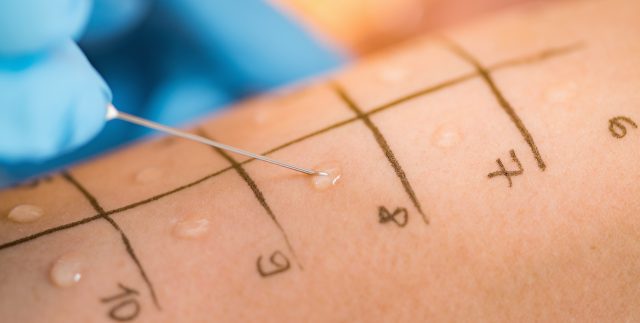An allergic reaction occurs when we come into contact with a substance that triggers the immune system, sending a message that our body is in need of defense. If severe enough, this reaction can potentially be deadly by making it harder for you to breathe or causing you to lose consciousness.
This severe allergic reaction is called anaphylaxis, and can be avoided with the help of allergy shots. We will be answering the question, “how do allergy shots work?” in addition to other important questions, so that you can make informed decisions about your health and allergy management.
What Are Allergy Shots?
Allergy shots (a type of immunotherapy) are injections that expose the immune system to small amounts of a particular allergen to gradually increase the body’s resistance to it. These shots can help mitigate most common allergic reactions, although they are not effective for food, medication, or feather allergies. They also cannot treat hives or eczema.

Why Aren’t There Allergy Shots for Food?
Unfortunately, people suffering from allergies to certain foods like nuts, fish/shellfish, eggs, wheat, or certain fruits are not eligible to receive allergy shots. There have been attempts to use allergy shots to treat these reactions, however these studies did not show promising results.
For people with food allergies, the best course of action continues to be just avoiding that particular food, and taking medication in the event of accidental exposure.
Are Allergy Shots Really Worth It?
For all other allergies, allergy shots are one of the more cost-effective methods of treatment. The shots work by treating the actual causes of the allergic reaction, as opposed to the symptoms like other allergy medications. Over the course of a lifetime, allergy shots are more cost effective than allergy medications as well; prices may vary based on a number of factors, but the consistent, long-term benefits they provide are greater than those of medication.

Why Get an Allergy Shot?
Even though allergy medications exist, they are not universally appealing for a variety of reasons. For example, an allergy medication may interfere with and cause adverse reactions if taken alongside other medications.
Or, perhaps, the allergen causing the allergic reaction is too common for you to avoid in your day-to-day life, and you would rather not have to take medication so often; the costs would quickly become inconvenient.
Some common, non-food allergies that allergy shots can be used to treat include, but are not limited to:
- Latex
- Dust Mites
- Pollen
- Ragweed
- Mold
- Animal Fur
- Insect Venom
- Fungi

How Do Allergy Shots Work in the Body?
Allergy shots are administered in stages over the course of several months. After a year of treatment, allergic reactions should lessen in severity or—in some cases—disappear entirely. In the beginning stages, sometimes referred to as the “build-up phase,” small doses of a particular allergen are administered to the upper arm once or twice a week for several months.
Your doctor will gradually increase the dosage until you reach what is referred to as a “maintenance dose,” at which point you will only need a shot every 2 to 4 weeks for about 4 or 5 months. By this time, you will be in the aptly named maintenance phase, and from here on out, shots will become less frequent—about once a month.
If the allergy shots are successful, maintenance treatment is generally continued for 3 to 5 years. Generally speaking, some allergic reaction symptoms fade during the build-up phase. However, the maintenance phase is typically when patients stop experiencing strong reactions.

Do Allergy Shots Work Permanently?
As mentioned above, symptoms generally lessen within the first two years. By year three, most patients are unaffected by the allergen they were treated for and no longer display significant signs of an allergic reaction.
Some patients will still need monthly shots to manage symptoms. However, there have been cases of patients no longer experiencing an allergic reaction after a few years, even after stopping their routine. This effectively makes allergy shots the closest thing to vaccines for allergies available today.
What Are Side Effects of Allergy Shots?
Because allergy shots work by exposing patients to small amounts of an allergen, a minor allergic reaction may occur after an allergy shot is administered; this typically manifests as slight redness, swelling, or irritation near the injection site. This can happen immediately or several hours later, but in either case, it will clear up soon after.
While less common, patients may also experience more serious reactions following an allergy shot, such as congestion, throat swelling, hives, or anaphylaxis. To avoid any potential complications, patients are required to be observed for 30 minutes after each shot—the typical amount of time it takes for a reaction to occur.
Are Allergy Shots Safe for Children?
Allergy shots are not recommended for children under the age of five. Younger children may have trouble explaining any reactions they may be experiencing, as well trouble following the build-up phase regimen.
How Village Emergency Centers Can Help
Doctors at emergency centers can help determine what is causing an allergic reaction with allergy tests, and then develop and proceed on an appropriate course of action. If your local emergency center finds that you are dealing with a food allergy, they can go over options for medications or other treatments available to help you. For other allergies, doctors at emergency centers can help you decide if seeing a specialist for further testing is necessary.
If you are having a severe allergic reaction, emergency centers have epinephrine injections readily available. If you believe you have been exposed to an allergen, and are experiencing symptoms, such as swelling, rashes, difficulty breathing, or red blotching of the skin, your local emergency center can quickly treat your symptoms and prevent the situation from becoming life threatening. In the event of a severe allergic reaction, head to the emergency center nearest you for medical assistance.
